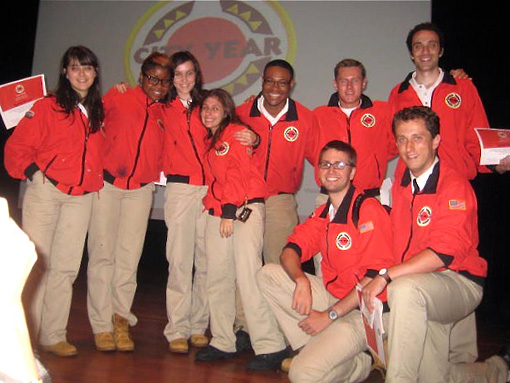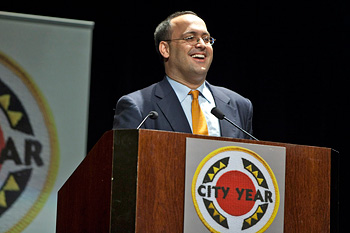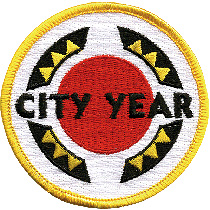
Jack Stupinski '10, front row, second from right, with the rest of his P.S. 111 City Year New York team at the ceremony marking the end of their service year in June 2011. Cornell is the top Ivy League feeder school for the City Year organization.
Itai Dinour '01 leads effort to keep New York City students in school
"Give a year. Change the world."
City Year New York's slogan -- and mission -- attracted 20 Cornellians last year to spend 10 months tutoring and mentoring at-risk youth in 22 New York City public schools, making Cornell the organization's No. 1 Ivy League feeder school. They joined about 250 other red-jacketed City Year New York corps members, age 17 to 24.

Itai Dinour '01 is executive director of City Year New York.
Itai Dinour '01, City Year New York executive director, says he acquired his public service ethos at the ILR School, doing hands-on work at Ithaca as a Cornell Tradition fellow. Despite exposure to the private sector -- Dinour worked at Goldman Sachs and at a law firm over two summers -- "I came to realize that this is how I want to spend my life," he says.
Dinour initially got involved with City Year when he was assigned to accompany its founder and then-president Michael Brown on campus in 2000. After the Sept. 11, 2001 terrorist attacks, City Year alumni decided to bring the organization to New York to harness the outpouring of civic spirit.
After entrepreneur Ken Grouf '93 co-founded City Year New York, he hired Dinour as its first staff member, as chief of staff in 2002, "which was sort of an ambiguous title because we had no staff, no office. And it was awesome," Dinour says. "Almost a decade later I defy my generation's stereotype -- I'm still here."
Dinour leads a highly regarded nonprofit focused on stemming the tidal wave of students who drop out of school. With a budget of $9 million and a full-time staff of 38, New York is the largest of City Year's 21 branches in the United States. The program's successes include reduced absenteeism, improved literacy test scores, increasing students' motivation by modeling enthusiasm for learning and instilling in students a belief they can succeed. U.S. Secretary of State Hillary Clinton and New York Mayor Michael Bloomberg are among its boosters.

Nationally, City Year has 2,000 corps members who serve 110,000 students in 187 schools, located in 21 U.S. cities.
"There are few of us who, almost every day for the last 10 years, have woken up and have really loved our jobs and been driven by the mission of the work we do," Dinour said at his 10-year Cornell reunion in 2011. "I think that is the best reward that I have every single day.
"To me, this is not just a job," Dinour continued. "This is very much my life's work. It's the center of who I am. Even in the thick of the 2008 crisis, even in the toughest of moments, to spend time at a school where City Year corps members are working and hear about their successes and challenges -- you are certainly filled up for the day if not the week."
Jack Stupinski '10, who worked at PS 111 in Long Island City, Queens, during school and in after-school programs in 2010-11, says that he "learned the value of simple things that most of us take for granted: a smile, a friend to listen, a high five on a cold morning, giving and getting respect. I learned something of what makes us proud, what makes us afraid. City Year was a once-in-a-lifetime chance to make changes in the world that too few people think are possible."
City Year New York receives five applications for every position available. One-third of City Year funding comes from federal entities such as AmeriCorps; the rest comes from philanthropic and corporate sources. Nationally, City Year has 2,000 corps members who serve 110,000 students in 187 schools.
"In the next year we want to add four more schools, which will mean about 60 more corps members," Dinour says. "We have been fortunate not to lose significant funding in this crisis, but in this very complicated political time in Washington, programs like AmeriCorps are in jeopardy."
Related links:
Cornell Chronicle Essentials blog item on Carlos Mendoza '08, a former City Year New York corps member, who visited the White House as part of the "Champions of Change" initiative in 2011